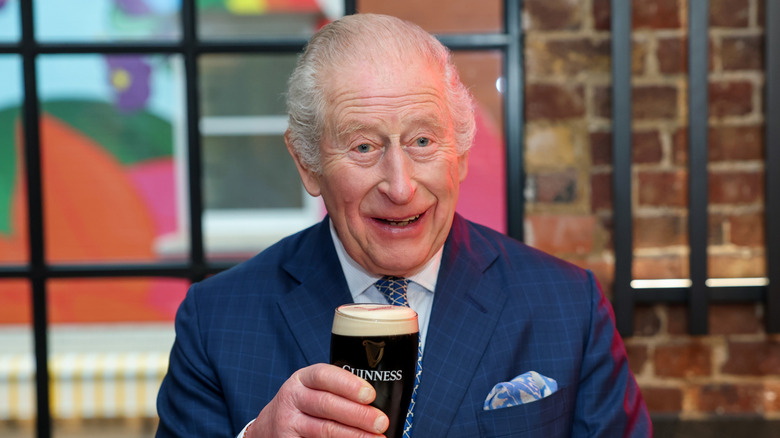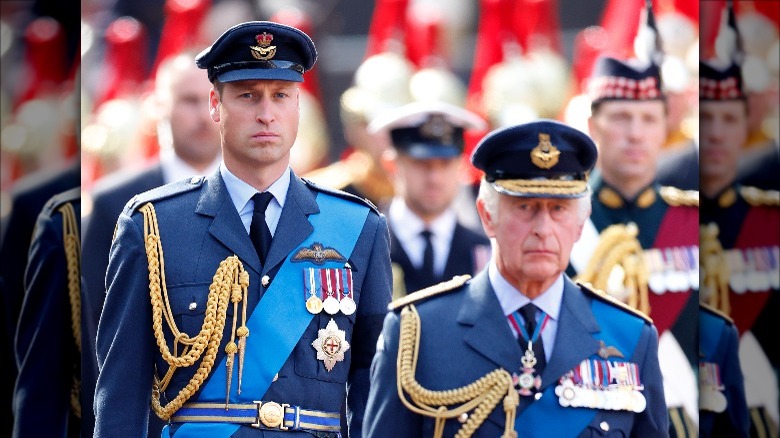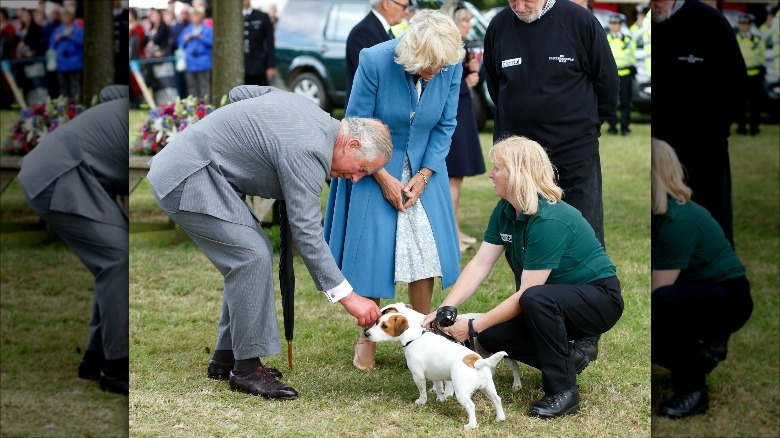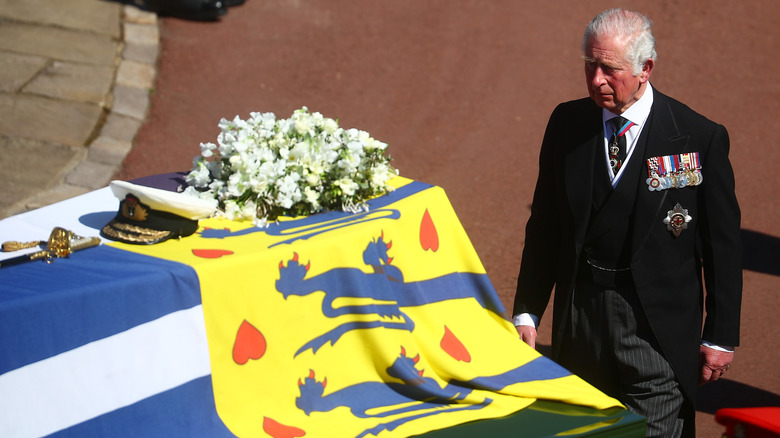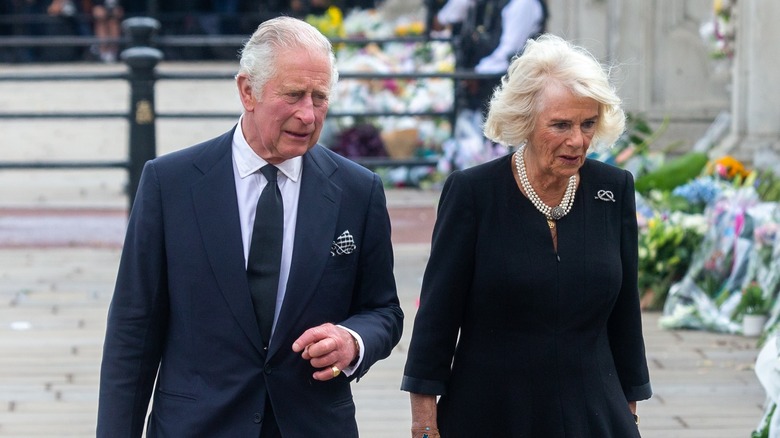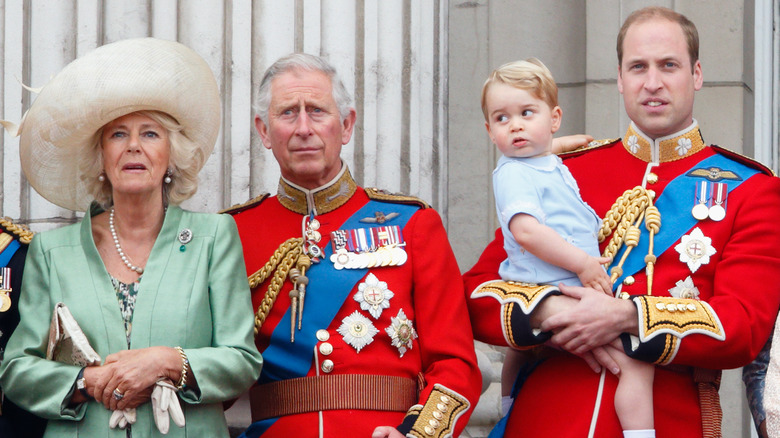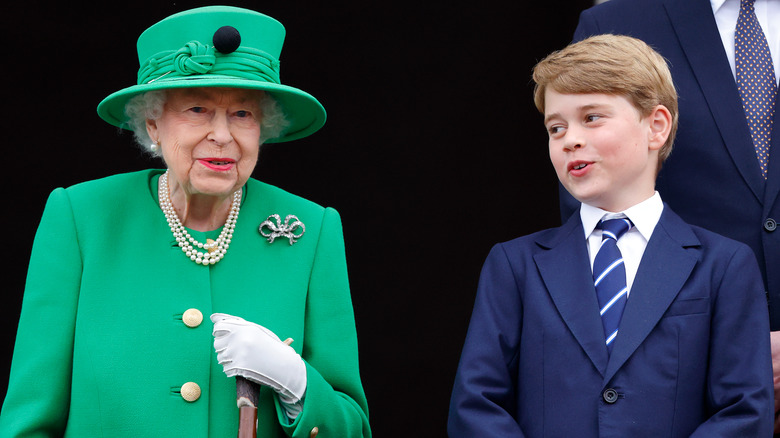What Will Happen When King Charles Dies?
From the moment Queen Elizabeth II died on September 8, 2022, all eyes have been on her son and successor, King Charles III. Fans and critics alike have been judging his every move and rating his early performance as king. So far, there has been both good and bad. For example, while he received praise for his heartfelt statement on the queen's death and made folks laugh with his viral Buckingham Palace entrance blunder, he also lost big points as his public temper sparked concern. Even so, the fact remains he is the United Kingdom's new monarch and now, per NPR, he's got his work cut out for him to win over the hearts of his people.
His legendary, history-making mother is a tough act to follow, but it seems he's slowly succeeding. According to a poll taken by YouGov after the queen's death, an impressive 63% of respondents said they think Charles will do a good job. Back in May 2022, just 32% of Britons said the same thing, which marks a huge jump in the right direction for the king. However, given he's in his 70s and the fact that his swollen hands have sparked health concerns, some can't help but wonder what will happen to the monarchy after Charles. Here's what you can expect to see when King Charles III dies.
A funeral fit for a king
When King Charles III dies, one thing is almost certain: He will receive a state funeral. As Business Insider explains, British royals, as well as their consorts, are automatically granted state funerals, unless they specifically choose to not have one. That was actually the case with Prince Philip. but it's most likely Charles will opt for his to be a state funeral. If so, it will be planned by The Earl Marshal, who is in charge of putting together all state ceremonies, including coronations.
While actual details are unknown, one can assume there will be many similarities between Queen Elizabeth II's funeral and her son's, as long-lasting traditions are sure to be carried on. For one, King Charles' coffin is likely to be transported using the state gun carriage of the Royal Navy, which last carried his mother's coffin through the various royal processions, per BBC, and was also used at the funeral of her father, King George VI, in 1952. Also likely is that there will be a lying-in-state, allowing people to pay their final respects. However, Vanity Fair notes that a monarch can refuse this portion of proceedings, as was the case with Queen Victoria in 1901. According to the BBC, other keystone elements of a royal funeral include a military procession and a service at Westminster Abbey, both of which we are likely to see following Charles' death.
Royal pets may steal the show (again)
One of the most memorable moments of Queen Elizabeth II's funeral on September 19, 2022 was the attendance of some of her beloved animals. First, when the queen's coffin arrived at Windsor Castle, it was greeted by a black pony named Emma who stood in the middle of the grounds to bid the queen farewell. Also present were her two final corgis, Sandy and Muick, who stood waiting on the quadrangle, per Reuters. Fans on Twitter responded with plenty of crying emojis and one wrote, "She would have loved the fact that her corgis were there."
The queen shared her love of animals with her son, and so, it's possible that King Charles III's own beloved pooches may have a similar role at his funeral. As it turns out, the king is a lover of Jack Russell terriers and is currently a pet parent to two. Named Bluebell and Beth, they were adopted by Camilla in 2017 from the Battersea Dogs and Cats Home in London, per Country Living. As the outlet notes, she previously told BBC Radio 5 Live she took Beth first but wanted her to have a friend and Bluebell followed just a few weeks later. Now, both dogs have a loving, regal home, and it's not the first time Charles has chosen this breed above all others. According to Reader's Digest, he had Jack Russell terriers as a child and in the '90s, had two, which were named Pooh and Tigga.
The royal burial grounds
More than 4.1 billion people watched Queen Elizabeth II's funeral on TV on September 19, 2022, per Newsweek, and as they did so, they saw her coffin being lowered down into the royal vault under the floor of St. George's Chapel in Windsor Castle. As Reuters confirmed, that wasn't to be her final resting place, however. Instead, she and her late husband, Prince Philip (who had temporarily been placed in the royal vault following his 2021 funeral), were permanently buried in the King George VI Memorial Chapel inside the church. There, they joined the tombs of both of the queen's parents, King George VI and Queen Elizabeth, as well as that of her younger sister, Princess Margaret.
As the outlet notes, over a dozen royals are buried at Windsor Castle, including the famous King Henry VIII who is also interred in St. George's Chapel. Funeral Guide explains that most modern royals are buried in the chapel itself, either in the royal vault or in various areas of the church. Alternatively, some have been laid to rest in the private royal burial ground at nearby Frogmore House. Given this tradition, it is likely King Charles III will also be buried here when he dies.
Prior to Windsor Castle, 30 kings and queens were buried at Westminster Abbey, including Queen Elizabeth I and Mary Queen of Scots. However, the last monarch to be interred at the abbey was George II in 1760, so it's highly unlikely this is where Charles would be buried.
What happens to Camilla if she outlives King Charles?
Upon her husband's ascension to the throne, Camilla's title changed from Duchess of Cornwall to Queen Consort Camilla. As Cosmopolitan points out, while the title contains the word "queen," its function is hugely different from an actual queen's because while a queen reigns (like Queen Elizabeth II), a queen consort is simply the spouse of a reigning king. That means she doesn't have any actual powers when it comes to ruling and decision-making. Even so, she is likely to get her own special moment in the spotlight come coronation day because, as the royal family website explains, "a queen consort is crowned with the king, in a similar but simpler ceremony."
Given her limited influence, many have wondered what would happen to Camilla if King Charles III were to die before her. If that's the case, she will not remain on the throne but rather, as a widow, her title will switch to queen dowager, per Cosmopolitan. Once Prince William (who is next in line to the throne after his father) is crowned, he may choose to honor his stepmother with the title of queen mother, per Reader's Digest Canada, which is usually reserved for a ruling monarch's widowed mother.
The royal line of succession, explained
According to the royals' official website, the line of succession to the throne isn't simply determined by blood but rather, it also requires a blessing from the government. As the site explains, following the Act of Settlement (1701), "the succession to the throne can be regulated by Parliament, and that a Sovereign can be deprived of his/her title through misgovernment." Currently, that line begins with William, the Prince of Wales. Following King Charles III's death, if Prince William is alive and well and doesn't choose to abdicate, he will automatically become the United Kingdom's new monarch, just like his father automatically became king following Queen Elizabeth's death. As for his royal title, he is most likely to become King William V.
Next in line after William are his three children (in order of age thanks to the Succession to the Crown Act 2013, which forbade a younger son from skipping over an older daughter): Prince George of Wales, Princess Charlotte of Wales, and Prince Louis of Wales. What some may find surprising is that if anything were to happen to William and his family (or if they were to abdicate), the line of succession would then swing to King Charles' second son, Prince Harry, and his children.
Will Prince George be the U.K.'s future king?
The short answer to this common question is yes, it is extremely likely that Prince George will indeed be the United Kingdom's future king. Once Prince Charles III dies, the royal line of succession will put Prince William on the throne, followed by his eldest son. As Robert Hazell, a professor of government and the constitution at the University College London, told Insider, "There is nothing to prevent William becoming king, other than his own premature death," in which case Prince George would become first in line after his grandfather. It's true that William could choose to abdicate, in which case the crown would pass straight from King Charles to Prince George, but that is unlikely, per Insider.
Given the near certainty of his future reign, it's no wonder William and Kate are already getting their son used to royal life. As a 9-year-old George showed during Queen Elizabeth's funeral, he is already beginning to take a prominent role in the monarchy. According to Mirror, William and Kate reportedly decided to tell their eldest son about his future obligations before he heard of them from anyone else. Royal biographer Robert Lacey told the outlet that "sometime around the boy's seventh birthday in the summer of 2020 it is thought that his parents went into more detail about what the little prince's life of future royal 'service and duty' would particularly involve." All to prepare him for his transformation into a possible King George VII.

